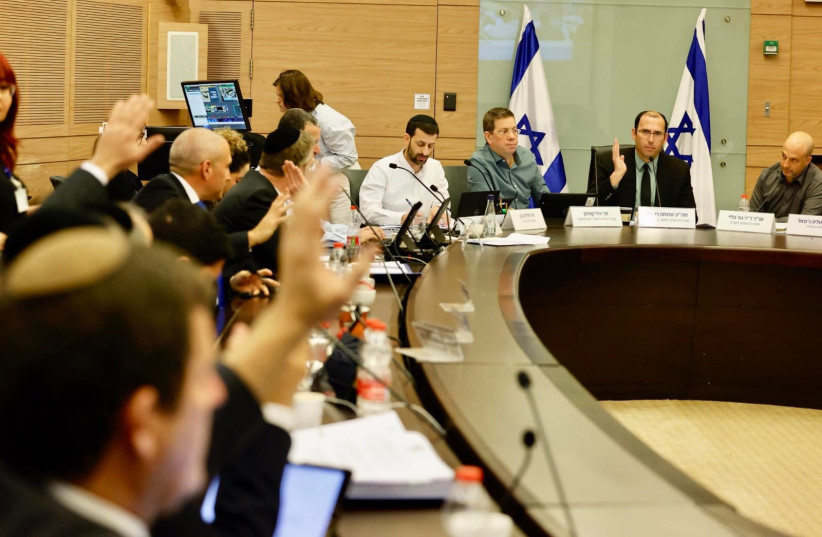The judicial reform's Judicial Selection Committee bill neared being sent to the Knesset in the Constitution, Law and Justice Committee on Sunday despite the Saturday night call by Defense Minister Yoav Gallant to cease the legislative process.
All but two of the 5,400 reservations to the bill were rejected on Sunday evening. After the reservations were rejected, the parties and factions gave statements on the reasonings for revisions to the bill.
Tensions were high at the opening of the Knesset workweek, which offers a small window to pass the judicial reform bill before the parliamentary body enters a recess.
The votes on the 3500 reservations remaining from last week were often disrupted by opposition members. MKs chanted in unison "dictatorship" while slamming on the table. MK Matti Sarfati Harkavi recited the a prayer for mourners, likely reference to opposition claims about the death of democracy in Israel should the reforms pass. Several opposition members were repeatedly expelled.
Law committee chairman Simcha Rothman decried the opposition’s conduct, which he said made it “impossible” to conduct the proceedings.

Law committee chairman Simcha Rothman decried the opposition's conduct, which he said made it "impossible" to conduct the proceedings.
Emotions run high on the Knesset floor
Knesset legal adviser Sagit Afik said that the high emotions were understandable given the votes on a controversial matter, but assured that all the votes were legal. Afik noted that the removed MKs could be brought back for votes, but also asked the opposition not to cause too many disruptions.
"There is a delicate tension between taking time and disrupting the votes," remarked Knesset legal adviser Sagit Afik. "You have exhausted the right to reservations in a nice way, but you cannot disrupt the votes in a serious way."
Much of the uproar by the opposition members was over demands to be able to give opening remarks and other statements as the consecutive voting proceeded.
The controversy was caused last week by the voting procedure selected by Rothman, due to the volume of reservations to the bill. Rothman elected to group the reservations by subject, and vote on them in groups rather than individually.
Reservations are pending changes added to bills prior to the committee's vote for approval to send the article to the Knesset for second and third votes. The submitters of the reservation explain their objection to provisions, which are voted on before the second reading.
Two reservations were attached to the Judicial Selection Committee bill on Wednesday night, against a provision requiring the political representatives on the panel to be from different factions. Coalition critics argued that this would give larger parties the same representation as smaller parties.
The bill would change the composition of the Judicial Selection Committee. Currently, the panel is made up of the High Court Justice, two other justices, the justice minister, another minister, two Knesset members and two Bar Association members.
The law requires that a hospital director "take into consideration the rights and needs of patients" before making such a decision.
The issue of hametz in hospitals is an issue that has come up every year in recent years. It even served as the official trigger for then Yamina MK and current Environmental Protection Minister Idit Silman to quit the previous coalition last April, after then Health Minister Nitzan Horowitz prohibited hospital directors from checking for hametz at the entrance in line with a High Court ruling on the matter. The move cost the previous government its majority and destabilized it, and it fell two months later.
The Knesset Home Committee on Sunday continued to advance the "Gifts Law," which enables government officials to receive donations in order to cover their medical and legal fees, and is intended to free the approximately NIS 4 million that was raised via crowdfunding for Prime Minister Benjamin Netanyahu's legal fees. A representative of the Attorney General said during a debate that the bill opened the door to corruption in the entire public service
The bill is being prepared for its first reading on the Knesset floor, and is likely to pass its first reading this week. Afik made similar comments on Sunday.
"Even after welcome changes, this bill still constitutes a deviation from maintaining the integrity [of public servants]," Afik said in the committee. "The proposal can create a built-in conflict-of-interest and the consequences regarding favors [to politicians] and possible damage to public trust. Part of the solution may be to make these changes apply in the future, beginning in the next Knesset."
A different Knesset committee, which was set up specially to institute two amendments to Basic Law: The Government, continued on Sunday to prepare what is known as the "Deri Law" for its second and third readings on the Knesset floor, and was scheduled to finish at some point on Sunday night.
The law blocks the High Court from intervening in a prime minister's appointment of ministers, and thus would enable Netanyahu to reappoint Shas chairman MK Aryeh Deri as health and interior minister after the High Court struck down the appointment in January due to its "extreme unreasonableness."
The second amendment to Basic Law: The Government, known as the "Incapacitation Law," passed into law last week. It blocked the option for Israel's attorney-general to announce a prime minister incapable of fulfilling his role due to conflicts of interest.
